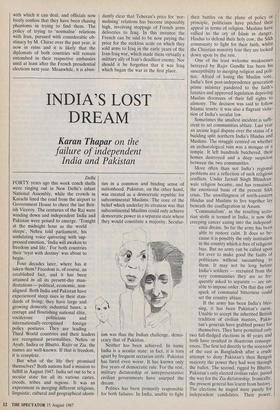INDIA'S LOST DREAM
Karan Thapar on the failure of independent India and Pakistan
Delhi FORTY years ago this week conch shells were ringing out in New Delhi's infant National Assembly, while the crowds in Karachi lined the road from the airport to Government House to cheer the last Brit- ish Viceroy. The centuries of the Raj were winding down and independent India and Pakistan were poised to emerge. 'Tonight at the midnight hour as the world sleeps', Nehru told parliament, his undulating voice quivering with sup- pressed emotion, 'India will awaken to freedom and life.' For both countries their 'tryst with destiny' was about to begin.
Four decades later, where has it taken them? Freedom is, of course, an established fact, and it has been attained in all its present-day man- ifestations — political, economic, non- aligned. Both India and Pakistan have experienced steep rises in their stan- dards of living; they have large and growing domestic industrial bases, a corrupt and flourishing national elite, vociferous politicians and internationally-recognised foreign policy postures. They are leading Third World countries and their leaders are recognised personalities. Nehru or Ayub, Indira or Bhutto, Rajiv or Zia, the names are well-known. If that is freedom, it is complete.
But what of the life they promised themselves? Both nations had a mission to fulfill in August 1947. India set out to be a secular state for all its various castes, creeds, tribes and regions. It was an experiment in merging different religious, linguistic, cultural and geographical identi- ties in a common and binding sense of nationhood. Pakistan, on the other hand, was created as a democratic republic for subcontinental Muslims. The core of the belief which underlay its creation was that subcontinental Muslims could only achieve democratic power in a separate state where they would constitute a majority. Secular-
ism was thus the Indian challenge, demo- cracy that of Pakistan.
Neither has been achieved. In name India is a secular state: in fact, it is torn apart by frequent sectarian strife. Pakistan has fared even worse. It has known only five years of democratic rule. For the rest, military dictatorship or unrepresentative civilian governments have usurped the dream.
Politics has been primarily responsible for both failures. In India, unable to fight their battles on the plane of policy or principle, politicians have pitched their appeal in terms of religion. Muslims have rallied to the cry of Islam in danger, Hindus to defend their holy cow, the Sikh community to fight for their faith, whilst the Christian minority fear they are looked down upon by the rest. One of the least welcome weaknesses betrayed by Rajiv Gandhi has been his susceptibility to merging religion and poli- tics. Afraid of losing the Muslim vote, India's first post-independence generation prime minister pandered to the faith's fanatics and approved legislation depriving Muslim divorcees of their full rights to alimony. The decision was said to follow Islamic tenets: it was also a flagrant viola- tion of India's secular law.
Sometimes the smallest incident is suffi- cient to set communities ablaze. Last year an arcane legal dispute over the status of a building split northern India's Hindus and Muslims. The struggle centred on whether an archaeological ruin was a mosque or a temple. It left hundreds butchered, their homes destroyed and a deep suspicion between the two communities.
More often than not India's regional problems are a reflection of such religious conflicts. Under Jarnail Singh Bhindran- wale religion became, and has remained, the emotional basis of the present Sikh crisis. The unwillingness of north-eastern Hindus and Muslims to live together lay beneath the conflagration in Assam.
'Communalism', as the resulting secta- rian strife is termed in India, is now the creeping cancer eating into the independ- ence dream. So far the army has been able to restore calm. It does so be- cause it is possibly the only institution in the country which is free of religious bias. But no army can be called upon for ever to make good the faults of politicians without succumbing to them. It may not be long before India's soldiers — recruited from the very communities they are so fre- quently asked to separate — are un- able to impose order. On that day one spark of communal bitterness could set the country ablaze.
If the army has been India's bles- sing, it has been Pakistan's curse. Unable to accept the inherited British tradition of civilian masters, Pakis- tan's generals have grabbed power for
themselves. They have permitted only two full-fledged elections in 40 years and both have resulted in disastrous consequ- ences. The first led directly to the secession of the east as Bangladesh after a crude attempt to deny Pakistan's then Bengali majority the power they had won through the ballot. The second, rigged by Bhutto, Pakistan's only elected civilian ruler, paved the way for the Zia dictatorship. Ironically, the present general has learnt from history. The elections he staged were purely for independent candidates. Their power,
under the constitution he has given them, is limited and can be revoked by him.
Bad luck and bad planning, perhaps more than anything else, are responsible for this failure as a modern, Muslim democracy. Mohammed Ali Jinnah, Pakis- tan's founder, died within 13 monthS of its creation. His domination of pre- independence Muslim politics and his de- termination to secure a separate Muslim state had been sufficient to force partition. But his absence thereafter left a yawning gap in Pakistani politics. The semi-feudal provinces which formed Pakistan lacked any other leader of stature to nurture the difficult discipline of democracy. They were simply too nervous of being dislodged from their precarious political perches to test their strength with a vote.
The explanation for this pusillanimity has a lot to do with the character of the Country they ruled. Granted by the British in response to the political demands of Muslims from central India, where as a minority they felt insecure, Pakistan was actually created in provinces where Mus- lims were a majority. Thus the new 'coun- try's leaders were 'refugees' in the areas they came to rule. As a result they lacked the confidence to test their acceptability. They simply continued in office because the departing Raj had left them there. It wasn't long before the army joined them. Under Ayub, Yahya and Zia it just took over.
Today, the army is at the bottom of most of Pakistan's problems. Its refusal to relin- quish power has stunted the country's politics, created regional divisions between the four provinces and fuelled corruption. Only a democratic government, which can claim nationwide allegiance, can hope to repair the fissures which threaten to rip the state apart. But while Benazir Bhutto is the civilian heir-presumptive that hope could remain unrealised.
So, secularism or democracy, India and Pakistan, the challenges have been evaded. Yet as the flags and buntings go up in Delhi and Islamabad this week these lapses will not worry the political or military hierarchies. Their speeches to their nations will be full of boasts, and grand claims. And they will make promises for the future more freedom and an even better life. After all, that is the stuff of anniversaries. But it is worth recalling the unfulfilled dreams of the not so distant past.



















































 Previous page
Previous page